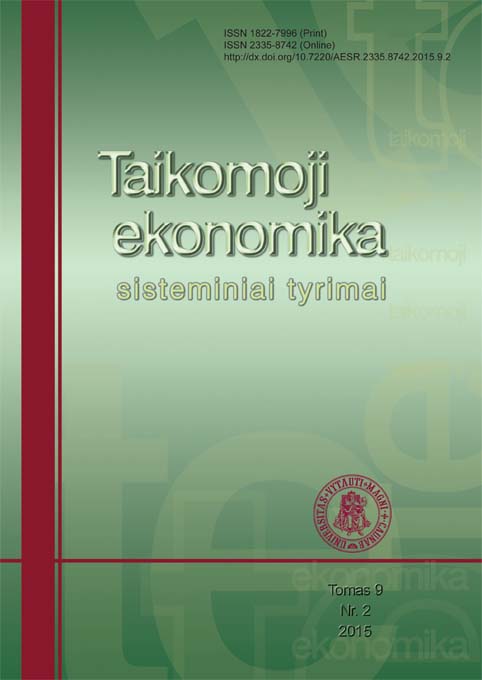Vyriausybės išlaidų poveikio pasitenkinimui gyvenimu vertinimas ES šalyse
Assessment of the Influence of Government Expenditure on Subjective Well-being in the European Union Countries
Author(s): Violeta Pukelienė, Justinas KisieliauskasSubject(s): National Economy, Welfare systems, EU-Accession / EU-DEvelopment
Published by: Vytauto Didžiojo Universitetas
Keywords: Subjective well-being; Happiness; Government spending; Welfare economics; Public choice theory
Summary/Abstract: The existence of government stands on preposition that there would be worse situation in society than without it. Traditional view of welfare economists suggest that governing body acts as a social planner maximising social welfare, however, this theoretical consideration is criticised by public choice scholars who prove that human traits cause misleading results in the size of government. The problem of research – is the size of government expenditure causing changes in subjective well-being of society? Authors answer the question by empirical analysis of the relationship between government expenditure and subjective well-being of society in the context of EU. Vyriausybės veikla pateisinama daugeliu argumentų. Tradicinės gerovės ekonomikos atstovai laikosi nuostatos, kad vyriausybė yra institucinis organas, kuris visuomenėje maksimizuoja socialinę gerovę. Kita vertus, viešojo pasirinkimo teorijos šalininkų teigimu, žmogiškos ydos verčia valdančiuosius nesielgti racionaliai, bet priešingai – pernelyg išplėsti vyriausybės veiklą, ypatingai kalbant apie jos išlaidų sistemą. Šio tyrimo probleminis klausimas: ar vyriausybės išlaidų dydis lemia pokyčius visuomenės gerovėje? Autoriai į klausimą atsako pateikdami empirinę vyriausybės išlaidų poveikio pasitenkinimo visuomenės gyvenimu analizę ES kontekste.
Journal: Taikomoji ekonomika: sisteminiai tyrimai
- Issue Year: 9/2015
- Issue No: 2
- Page Range: 31-48
- Page Count: 18
- Language: English

